


|
| ||
|
|
| |

|
SILVER EDITION

|


|
SILVER EDITION |
|
Introduction |
About Nulceus |
Question Overview |
Page Gallery |
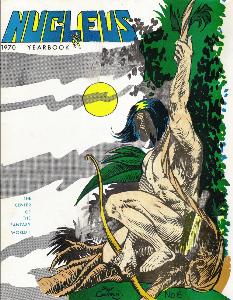
This interview was first published in Nucleus #6, the Nucleus 1970 Yearbook, which was actually published in 1971 due to printing delays. The additional question at the end appeared in Nucleus #8 in 1973. The entire interview was arranged by Mark Wheatley, the questions were composed by Bill Cantey.
The following Question Overview and the individual question headings were added specifically for this online reproduction of the interview. Due to the differences in medium, I also added some extra indentation.
The first issue of Bill Cantey's fanzine, Nucleus, was published in 1969, during his high school and early college years at the Virginia Commonwealth University. The fanzine, of which only 100 copies per issue were printed, ran for about six years, until the mid seventies, when, after 9 issues, publication was ended.
 Interview Introduction
Interview IntroductionCreations of Gor! Interviewing John Norman, by Bill Cantey
When author John Norman tentatively agreed to be interviewed by NUCLEUS, your editor, Mark Wheatley, asked me to handle the actual text. Norman's epic tale, involving the Earthman Tarl Cabot in a series of adventures on the planet Gor, may well be the most satisfying set of "Sword & Science" novels ever to be written. The major inconsistency of stories involving swordplay and modern technology is neatly explained by the existence of a mysterious sect of unseen "Priest-Kings," who disallow modern weapons and vehicles under penalty of a sudden and certain "Flame Death." Fulfillment of the highly desirable fantasy of controlled flight is accomplished by having the elite warriors of Gor mounted on Tarns, gigantic fighting-hawks. It is a very tightly written series, filled with graphically described action, subtle humor, and thought provoking situations. A must-read set of novels for the fan of heroic-fantasy, science-fiction, or anyone fortunate enough to possess the all important "suspension of disbelief" ability that is necessary to enjoy any and all forms of escape entertainment.
Bill Cantey
 What is Counter-Earth?
What is Counter-Earth?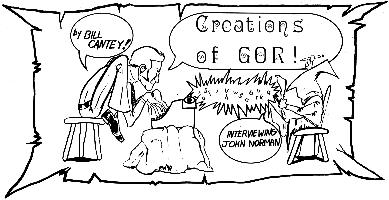
Bill: Your Gorean stories take place on an unknown planet within our solar system. A "Counter-Earth," occupying the same plane of orbit and maintaining a pace of movement corresponding to our own Earth's so that the two are always on opposite sides of the sun and hidden from each other's view. Did you invent the "Counter-Earth" theory? Is it at all possible?
Norman: The Greek expression for Counter-Earth is 'Anticthon'. Speculation on its existence is, accordingly, ancient.
Whether or not a Counter-Earth is empirically possible rather than merely logically, is an interesting question. It seems essentially to depend on whether or not gravitational attraction can be masked, deflected, or manipulated. It may be that we are as ignorant of gravity, aside from the mathematical descriptions of correlated movements, as the Romans were of electricity, who were, for all their ignorance, yet aware of the flash of lightning over the Palatine or the static charges in the pelts of arena animals. If gravitational power can be harnessed, can be manipulated, as, for example, electromagnetism can, then I think there is no unsuperable empirical difficulty in the Counter-Earth hypothesis. The Priest-Kings would arrange for the diffusion or masking of gravitational effects in such a way as to keep the planet in the system, and yet undetected. Perhaps the incredible gravitational field of the sun itself might presumably also be used to influence light rays in such a way as to provide visual shielding, as well as gravitational shielding. Man now uses gravity, when he descends starirs, when he rolls objects downhill, when he puts a satellite in orbit, when he uses a planet to gain the looping slingshot effect to impel his space vehicles. Whether he can actively control this force, as well as simply make use of its standing, undisturbed effects in a primitive fashion, I do not know. It is of course the force binding together universes. There is little wonder the Priest-Kings are wary of it. Witness the horror of Misk in Priest-Kings, when Sarm resorts to gravitational disruption. (These questions are touched on in various places. Try Tarnsman, pp. 33-35, and Priest-Kings, pp. 239-243.)
Incidentally, having the Counter-Earth in our system, rather than tucked away in another galaxy, or half-way down the corridor to the Milky Way, is dramatically useful. It not only takes advantage of ancient speculation, but it brings the books, perhaps, closer to us; they are there, not far; it is with us; and, further, commerce, so to speak, between the Counter-Earth and the Earth becomes, perhaps, less scientifically tenuous; we are not involved in interstellar distances, with the difficulties of negotiating space-patches that would take a light beam centuries to cross; I am not at all convinced of the feasibility of faster-than-light drives, also (FTL drives). Given the stipulation that such a drive is possible, much, of course, may be done. For example, the Star Trek series did not suffer in believability from its frequent recourse to warp-drive. The proximity of the Counter-Earth, on the other hand, allows me to remain, at least for the time, neutral, uncommitted, on the possibility of FTL drive. I recommend FTL drive, of course, to authors who are tempted to use it. It may be possible; and sometime Einstein may be as revered, but remote, to us as Archimedes or Hiero of Syracuse. Incidentally, certain particles, I gather, have, under laboratory conditions, been accelerated to speeds greater than the supposedly limiting velocity of light. Accordingly, I encourage authors to use FTL drive to achieve whetever effects they want. It is a particularly rich, particularly fertile, liberating dramatic premise.
 Is Gor Sword & Science?
Is Gor Sword & Science?Bill: I've referred to your "Counter-Earth" novels as "Sword & Science." Do you object to that definition? Is there a more distinctive term that indicates a story wherein the main character, a highly capable Earthman, is somehow transported to a bizarre, exciting world? "Fantasy-Adventure" covers it, but is it possible that a more descriptive definition exists?
Norman: I seem to have taken a great deal of time to respond to your first question. Let me now become more brief.
I do not find the expression 'sword and science' particularly illuminating.
Perhaps the Gor books might better be described by the expression 'the Gor books'.
The Gor books are not to be categorized but read; they are less to be named than experienced. I suppose any author would feel the same way. The abstract label, with its own connotations and pigeon-holey reeks, is never found, I expect, felicitous. The definition of the Gor books is the Gor books themselves. If one wants categories, let us refer to them as fiction, or, less broadly, as science fiction.
Perhaps better descriptive expressions may be found, but I, for one, do not feel coerced to look for them.
Labels are always, it seems, pasted on the outside of the bottle.
 3. Have you written any other books?
3. Have you written any other books?Bill: Tarnsman Of Gor introduced me to your books. Since then, I've acquired the four sequels and your western, Ghost Dance. I found all six on the newsracks, which I consider a very healthy sign. Are the books doing well? Have you written others? Is Ballantine your exclusive publisher?
Norman: I gather the books are doing well. Tarnsman, Outlaw and Priest-Kings are in their second edition; the first three books have, or will have, a hardback edition in England; Tarnsman is also in paperback in Britain; and the first four books are due to come out in Japanese translation.
Ballantine has published all my novels.
I have written a professional book in my field, philosophy, which has been published and have another under contract. I have also edited a book within the philosophical field. I assume these books are not of interest in this context.
 4. Is Assassin the final book in the Gorean series?
4. Is Assassin the final book in the Gorean series?Bill: I haven't read Ghost Dance or Assassin Of Gor yet. Is Assassin the final book in the Gorean series? Will Ghost Dance begin a new series of novels, based on the people of our planet?
Norman: Get busy and read them.
No, Assassin is not the final book in the Gorean series.
Ghost Dance is based on a book I wrote many years ago and did not sell. I later rewrote it, improved it considerably, I believe, and sold it. I think it is a good book. I do not see it as the first book in a series. I think it should stand as it is.
 5. What about John
5. What about JohnBill: The first three volumes in "The Chronicles Of Counter-Earth" are copyrighted by "John Lange", but the last two are under the copyright of "John Norman". Would you care to comment on that? I suspect that you have a "use-name" and a "true-name".
Norman: I'm as puzzled as you are. I do not know why the first three novels were copyrighted under the name John Lange and not John Norman, nor why the last two were copyrighted under the name John Norman and not John Lange. Perhaps I should find out. At any rate, John Norman is a writing-name, and John Lange is my own name. I do not know whether it was a good idea to use a pseudonym or not. I might not, if I was starting out again. 'John Norman' seems to be a good writing-name. I do not expect you would pronounce 'Lange' correctly. I usually have to repeat it a few times to new acquaintances.
 6. Were you influenced by Edgar Rice Burroughs?
6. Were you influenced by Edgar Rice Burroughs?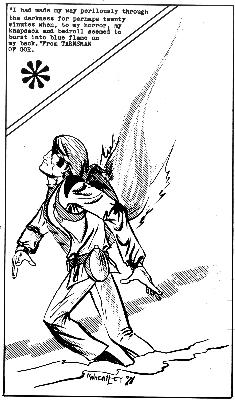
Bill: ERB-dom, a very fine fanzine based on the works of Edgar Rice Burroughs, encouraged its readers to try the Gorean novels. Tarl Cabot, the hero of Gor, has often been compared to John Carter, the main character in Burroughs' Martian series. (EDITOR'S NOTE: For more information on John Carter, refer to Bill Cantey's article in issue No. 3*4 of NUCLEUS.) Even Ballantine Books made a reference to the comparison. I saw a marked resemblance to Burroughs' style in Tarnsman Of Gor. But, it's a personal hang-up with me; Burroughs is my most-read author, and I use him as a sort of literary yardstick. By the time I was half-way through your second novel, Outlaw Of Gor, the differences outweighed the similarities by far. Now, the only associations that I perceive are also shared by other "escape-authors". Andre Norton's Witch World series. Jack Vance's Planet Of Adventure. Ted White's Qar. Robert E. Howard's Almuric. You might even include Pierre Boulle's Planet Of The Apes, as well as the classics, Gulliver's Travels by Jonathan Swift and A Connecticut Yankee In King Arthur's Court by Mark Twain.
Had you read Burroughs, Kline, or delved into any other "Science-Fantasy" adventure series before writing your own?
Incidentally, of the worlds that I've mentioned, I consider "Gor" the most entrancing; and that includes Burroughs' "Barsoom".
Norman: Cabot had a childhood, and not a happy one, it seems. He was raised, apparently, without much love. He protected himself by his fists and his lonliness. Humor was, as well, a shield. He was, in effect, homeless on Earth. He could not understand, as a boy growing up, the intricacies of intrigue and conflict into which he was, at first, unwillingly drawn. He is apparently open, and yet not easy to approach. Within him there is a core which fears to be hurt. He does not always understand, any more than many of us, why he finds himself as he is, or what it might mean. He senses much beyond what he can grasp. He must act. He does. But he reflects, he considers, he worries. He is capable of guilt, and of unreasoning rage; of sacrifice, and yet of fear; he is a strong man, and a good man, but he is capable of sudden, intemperate cruelty and even of pettiness. He is fully capable of injuring others, but will seldom choose to do so. He enjoys drinking, and song, and fellowship. He is perhaps too much attracted to women. He has gifts, but weaknesses as well. He is sometimes too gullible, too trusting. He would never, as Kamchak said, "make a Tuchuk." He wants to reach out to people, but often fails to do so. He has pride, perhaps too much pride. He has a self-image of himself, perhaps an unreasonable one, holding himself more accountable than perhaps he ought for his actions. He is no stranger to the torments of responsibility and decision. Torn between the values and expectations of two worlds, our Earth, and Gor, Cabot must find his own way. There are no road maps for him, for the cultural ease furnished by a unitary system, a unified ethos, is not his. In short, Cabot, one hopes, is not a typical figure for cardboard fantsasies. Those who seek such heroes must go elsewhere. Those readers I must abandon. Cabot is real, and this means sadness, and torture and joy, and frustration and failure, at times, having a friend, touching a woman, loving, and achieving a manhood, won both in defeat and victory.
An extremely large number of sources have inspired the Gor series. I do not think it is the author's job to speculate on influences, which are, in any case, doubtless subtle, complex and numerous. The critic is the man for that.
I appreciate your kind remark on the world of "Gor."
 7. How about the slavery?
7. How about the slavery?Bill: Outlaw Of Gor involved as a major part of its plot, a female government that made The Women's Liberation Movement look like a Turkish Harem by comparison. The battle of the sexes plays an important part in the entire series, and is one of the components that gives "The Chronicles Of Counter-Earth" a unique quality, as well as a highly satisfying sense of humor. In Nomads Of Gor, Tarl Cabot's Gorean friend, Kamchak, sees nothing wrong with tying a rebellious female inside a large, leather sack, usually used to gather dried dung. Now, maybe most men in today's world wouldn't want to see a beautiful girl beaten or branded, but I doubt that an adult female walks the Earth who wouldn't profit by at least one night in the dung sack. It is a different form of "escape-reading", well suited to today's attitudes.
However, L. Sprague de Camp, a fine fantasy-writer and acknowledged expert, condemns your story's conclusion that women really want to be enslaved by men as a silly idea. Did you intend for anyone to take the situation seriously? Wasn't the glorified capture of gorgeous girls to be considered with the same "suspension of disbelief" as the "Counter-Earth" logic?
Norman: I think I do not choose to discuss this question. Perhaps sometime, over a succession of cups of coffee, we might consider it.
The question is extremely complex and involves, I expect, history and evolution; physiology and biology; culture and anthropology. I do not, incidentally, repudiate what I have written. I do not think, with Mr. de Camp, that anything here is silly; though I am prepared to admit that superficially, because seemingly strange and apparently counter-intuitive, it might appear, at least at first, as silly. I note that Elizabeth, in Nomads, thought the whole thing was silly, too, until she found herself totally Cabot's, until she found herself, in spite of herself, totally yielded to him. The hypothesis, of course, if there is one, need not be that any woman would wish to be enslaved by any man, which is surely dubious, but rather, perhaps, that for every woman there is some man, somewhere, or could be some man, such that she would be to him, to him, to that man, particularly if culturally reinforced, an eager and submissive slave girl. This, of course, might not be true. I leave it to the secret fantasies of beautiful women. At any rate, we must remember that this image of woman is only one image of her, and the other primary Gorean image is that of the Free Companion. It is hard to be a man; it is probably harder to be a woman.
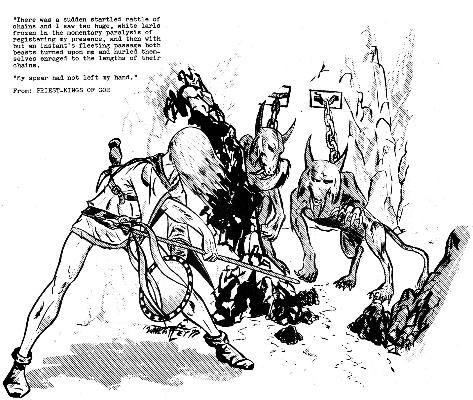
 8. Do you feel your writing has improved?
8. Do you feel your writing has improved?Bill: L. Sprague de Camp often writes mini book-reviews for AMRA, a high-grade fanzine that caters to the fans of Robert E. Howard's "Conan"; and to Heroic-Fantasy fans in general. Mr. de Camp is something of a purist, declaring that Heroic-Fantasy and Sword & Sorcery are synonymous terms. Before I struck that snag of information, Heroic-Fantasy seemed an appropriate definition for the Gorean series. De Camp is mildly offended by modern or ultra-advanced technology existing side-by-side with romantic weaponry, such as a sword being carried with a ray-gun. Needless to say, he did not like the Gorean works; his rating for Tarnsman of Gor in AMRA #47 read, "Mediocre is the word - readable - but forgettable." I disagreed, but bowed to his superior knowledge. So, I was especially pleased when he did a turnabout in AMRA #52, giving Nomads of Gor a high rating. Do you feel your writing improved as you advanced into the series? Would you rewrite anything? I am beginning to think of "The Chronicles Of Counter-Earth" as one huge book, bound in tharlarion leather, with the word "Gor" branded on the front cover. Of course, that's just a dream-wish; but is there any chance that the Gorean books will ever be published in hard-cover?
Norman: Let words work for you, not you for them. "Heroic fantasy" might be a good expression to cover both "Sword and Science" and "Sword and Sorcery". "Adventure Fantasy" might work, too. Some words are worth fighting over; I'm not sure these are. Try to be understood; dictionaries are not likely to win interesting arguments; besides, whose dictionary will you use? Let's not worry too much about labels. (See Question #2.)
Technological paradox is one of the prime premises of the Gorean series. The Goreans, we learn, are quite advanced in several areas, for example, architecture, lighting and medicine. One of the premises of the series is that Priest-Kings do not intend to be threatened by human beings; accordingly, they put controls on certain technological developments; in areas, however, where these controls are absent one might expect human advancement, limited, of course, by tradition, idiosyncrasy and the isolation of the critics, to take place; indeed, one might expect that much energy and intelligence which might have been spent in destructive channels would, under such circumstances, be diverted tosuperior pursuits.
How could you disagree, and bow simultaneously? If you disagree, do not bow. Unless, of course, you stand to get your head knocked off for not doing so. Nothing, of course, prevents bowing and scheming simultaneously.
Yes, I think my writing has improved since Tarnsman.
I am more concerned with the future than the past.
The first three Gor books, as mentioned in Question #3, are either out, or due to come out, in hard cover in Britain.
I think it must be understood that deciding to bring out hardcover editions of the Gorean series is not like deciding to put out one book. I would not blame a publisher for hesitating before undertaking such a commitment. How many books of one author should a given house publish? There are a number of problems involved. It would, of course, be nice if there were an American hardcover edition. I am not, however, actively seeking such an edition.
 9. Why is each book longer then the previous one?
9. Why is each book longer then the previous one?Bill: I have before me the first five volumes of "Counter-Earth". It is easy to see that the length of each book increases as the series progresses. The first is only a little more than two hundred pages; the fifth is over four hundred. Did you plan it that way, or was it pure "happenstance"?
Norman: I do not like to plan the lengths of books. I like to have them grow in their own shapes at their own speeds. I prefer for their development to be organic, a function of what has come before and might come later, rather than mechanical, so many pages to each part of an outline. I like the book to uncover itself. I like to find it, and watch it. I like to follow it. I like to discover them, each one its own continent, different and, to me, wondrous.
On the other hand, there are, of course, production problems. Ideals are worth seeking. Sometimes one finds one.
 10. Do any of your critics get nasty?
10. Do any of your critics get nasty?Bill: Your books are catalogued as "Fantasy Adventure", and rightly so. But, there are some tidbits of realism to be gleaned from those fifteen hundred pages. The Gorean caste system, based on intellect, being an excellent example. Also, your reference to languages as "living thought" will not soon be forgotten by this reader. But, do any of your critics get nasty? I know it's an occupational hazard; anything worth reading is gonna make someone, somewhere, mad as Hell. Any trouble from religious groups?
Norman: The Gorean caste system, as I conceive it, is not a simple function of intellect. It is more often a function of descent and tradition. This does not preclude, however, one "raising" or "lowering" caste. With respect to certain castes, of course, intellect would indeed be of great importance. There is no reason, however, to suppose that the Initiates, who regard themselves as Gor's highest caste, are any more intelligent than, say, the Physicians or the Scribes.
There are brilliant men presumably in all castes.
It is not my practice to comment publicly on criticism. Accordingly, I decline to respond further to this question.
I will say, however, that I think an author should, if possible, write for himself; he should write to please himself, not someone else. Further, individuals subscribe to different value judgments, have different needs, have different conceptions of intent and quality. Your writing should be your own. To write to please critics is to be their unpaid employee. Write what you want. If critics understand and respond and appreciate it, excellent; if they don't, or they think you are trying to do something else, and aren't, forget it. The critic must remember that the author is an intelligent person and presumably knows exactly what he is doing, and is doing things the way he wants. If they like it, good; if they don't, all right. I personally would not want to be a critic; it seems to me the serious critic has an extremely difficult, and responsible, job; writing is hard enough. Who can sum up a human being, or a work of literature? I am not even sure, incidentally, that criticism is valuable. Personal intelligent talking about plotting, characterization, development, etc. is, or can be, valuable. Adjective pasting is not. Also, criticism can be dangerous; it might, it seems to me, if permitted, interfere with the felicitous momentums and enthusiasms of creativity. I belong to no school and no wave. Essentially I doubt that any author does. It is the author's business to find his own island and plant his own flag there.
Being human, I am hurt, or angered, when I meet with scorn; being human, I am pleased when I am praised. But whether scorned or praised, the work is the important thing; the work; make the work true, make it honest, make it real, make it, if you can, great. That is the important thing. Not being a writer. Not being disapproved, or approved. But the work. The work is the important thing. The work. Concentrate always, with what you have, on the work.
 11. Who's your favorite character in the series?
11. Who's your favorite character in the series?Bill: Besides Tarl Cabot, who's your favorite character in the series? Nar, of the Spider People, who refused to harm rational creatures, although he himself was often hunted and harassed, was a beautiful idea. Kamchak, of the Wagon People, came close to eclipsing Gor's starring hero. I'd guess, one of the two would be your pet personality.
Norman: Here is a good spot to save you some space. Let me say, briefly, I shall not respond to this question. How about that?
Now I shall respond; I like dozens of characters in the Gorean series. I do not want to pick favorites.
How about that?
 12. Which was your favorite cover?
12. Which was your favorite cover?Bill: Which was your favorite cover-painting in the Gorean series?
Norman: I think that the second cover may be my favorite. I also like the fourth. (Isn't Elizabeth beautiful there?) The tarn, I note, is well drawn on the fifth cover.
 13. What about a Gorean comic adaptation?
13. What about a Gorean comic adaptation?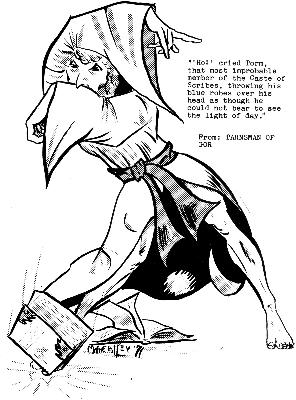
Bill: Would you be interested in having your Gorean books "translated" into comic form? I can easily imagine it, presented in the style of Alex Raymond's "Flash Gordon". Which brings to mind the illustrative talents of Al Williamson and Gray Morrow. Berni Wrightson, Wally Wood, or Jim Steranko could also do an outstanding job of turning your thousands of words into pictures. And of course, it would be blasphemous not to mention Frank Frazetta. Are you a fan of comics at all? Personally, I think the lowly comic-book could be the most communicative form of visual entertainment that's ever existed, if it can manage to escape its lowbrow image.
Norman: The Gorean series seems to me pretty strong stuff for translating into comic form.
I have not been a fan of comics for many years.
I do appreciate your sense of the untapped potential of the pictorial story, with the possibility of a cascade of emphases. It has going for it something of the superiority of art over the photograph, and something of the superiority of motion over the static illustration.
Art forms develop. Perhaps in a few years the comic form will not seem as lowly as it does now to many people. Perhaps in a few years one's current reservations will be inappropriate.
In thinking of the difficulty of putting the Gorean series into comic form, of course, one should have in mind not only such matters as the Gorean institution of capture and its consequences, but subtler things as well, the interior side of the series, its philosophy, its ethos, etc.
The Gorean series, incidentally, if this is pertinent, is written for adults. These adults, of course, will presumably retain in their minds a pocket for fancy and fantasy, a pocket hopefully that only the duller and more mediocre minds can manage to outgrow. We will read fantasy as long as we carry our daydreams about with us; as long as we find ourselves unaccommodated and uncrushed among the sand-papers and turning wheels of routine; that so many have cared to dream themselves to the skies of Gor makes of the imagination and needs of men, in my opinion, an incontrovertible fact.
I expect that someone who is more familiar with pictorial translations than I am would be better entitled to comment on this question.
I will mention, however, that I do not actively seek a pictorial translation of the Gorean series.
 14. What about motion pictures?
14. What about motion pictures?Bill: What about motion pictures? Some of the scenes in the Gor books seem to be set up for the film industry. Would you like to produce and/or direct a movie version of any of your books? Who would you trust to write a screenplay? Could you suggest an actor to portray Tarl Cabot?
Norman: When, in writing Tarnsman, I decided to use tarns, I informed myself that that finished things as far as the motion pictures were concerned. I used tarns, of course, because I wanted to, because they seemed magnificent. If eventual movie rights had been more important than what I was writing I presumably wouldn't have put them in. But they are there. And I'm glad of it.
I doubt that tarns could be convincingly done in the motion pictures. How could one, in a photographic medium, convey the savagery, the pride, the ferocity of such creatures? And how could one make clear, in a motion picture, what must be the nature of the men who could stand before such a creature and make it do his bidding; and make it clear the nature of a man who could engage in warfare, turning and spinning, in the skies in the saddle of such a beast? I am afraid these things are largely for the incomparable and fantastic theaters of the imagination pitched to the point of exultation; how can you photograph a poem, or music, or fear or joy, or a cry of welcome to an enemy, that he has come against you?
Accordingly, I have no expectations of a film version of the Gor series.
Specifically, in answer to your four questions, I would not feel competent to either produce or direct a motion picture based on the Gor series. I would feel competent, of course, to make recommendations and suggestions. I am not familiar with writers of screenplays. I imagine the signing of a writer, or writers, would be the producer's job, perhaps in consultation with the director and others. Who the author might trust is probably less important than who the producer and director would think could do the job. It might be nice, of course, to contribute to, or write, the screenplay. I am not aware, at the moment, of any actor whom I might like to see portray Cabot. I myself, of course, am exceedingly young and handsome, but being only three feet high and weighing twenty-seven pounds, I would probably not get the part because of prejudice against three-foot-high, twenty-seven-pound heroes.
At any rate, as I mentioned before, it does not seem to me that the Gorean series is a likely candidate for motion pictures.
And, perhaps, that is just as well.
But let that be spoken among us, as it is said, to the towers.
Lest dollar bills be listening.
Thank you very much, incidentally, for the opportunity to participate in this interview. I have enjoyed it.
 15. A final thanks.
15. A final thanks.Bill: That's all, except for a final thanks. Asking a professional writer to write anything, is like asking a house painter to paint a couple of rooms as a personal favour. So, we do sincerely appreciate your complying with this interview. A successful writer creates a world; you have succeeded. I congratulate and envy you.
Norman: Thanks again. I wish you well.
 16. The Question? The Answer!
16. The Question? The Answer!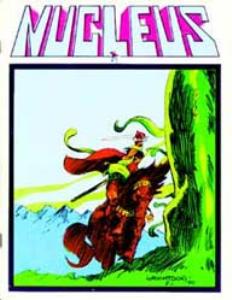
Mark Wheatley:: Jack, for some time now, there has been a rumor passing around to the effect that John Lange and Michael Crichton, author of the Andromeda Strain, Terminal Man, etc., are one and the same. I never really thought that much of it until I first noticed that it had been mentioned in Life Magazine. Years ago, I had noticed a story in a men's adventure type publication by a Jack Lange. I had meant to ask you about it at the time, but it slipped my mind. Both of these things were brought to mind recently when I saw a new paperback on the stands. It was billed as follows: "One Of The Best Since The Andromeda Strain And Terminal Man; Binary." After that lead-in, you'd expect the book to be by Michael Crichton, right? No, by Jack Lange, it reads. So, could you clear this up?
Jack Lange:: I can answer your question very clearly, and very publicly. I am not now, and never have been, and do not expect ever to be Michael Crichton.
This mistaken identification, incidentally, has been made several times before. I expect the original source of the confusion is that Michael Crichton, for some detective novels, Odds On, Scratch One, etc., selected, doubtless by sheer, if fantastic coincidence, the pseudonym 'John Lange', which is my name. In fact, Crichton's Odds On came out in paperback in December 66, the same month and year as Tarnsman of Gor came out in paperback, under my pseudonym of 'John Norman', but copyrighted in my own name, 'John Lange'. It would have been delightful if the real name of Odd's On's author might have been John Norman, but no such luck.
The plot, of course, is thick.
For example, someone name John Lange has published a book entitled Drug of Choice. That is not my book. Whether it is Michael Crichton's I do not know. Similarly, I do not know if the story you saw in a Man's Adventure type fiction mag by a guy named Jack Lange was by Michael Crichton or not. I just do not know. It was not by me however. That I know.
It could be that, because of the confusion, Crichton has started to use 'Jack Lange' as a pseudonym, instead of 'John Lange'. The library of Congress, incidentally, made a misidentification of Crichton and Lange, also, with consequent carnage of the truth wrought perhaps globally, threatening the integrity of the library systems of Earth. They have, however, I gather, corrected their mistake, and new computer cards have rushed forth to rectify the situation.
I do not know if there are three of us, or only two of us. There are, however, at least two of us. I do not know if Crichton has switched to 'Jack Lange' or if there is another fellow by that name, writing, too. Fortunately, perhaps, I do not publish under the name 'Jack Lange'. On the other hand, that is what my friends and those who generally know me, call me. It is what I think of as my informal name. Usually only strangers, or business acquaintances, would call me 'John'. I would have no objection if Crichton would switch to Gregory Q. Witherspoon. Then we might both have less trouble.
Copyright © 1970 & 1973 by Mark Wheatley - All Rights Reserved.
Published with kind permission of both the author and John Norman.
This reproduction copyright © 2012 by The Complete John Norman.
 Page Gallery
Page Gallery
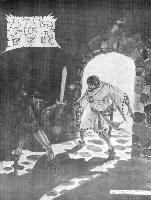
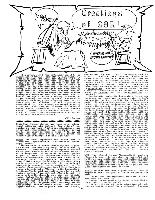
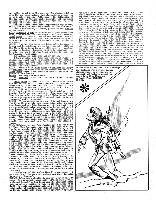
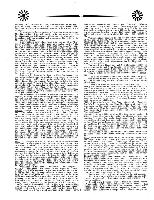
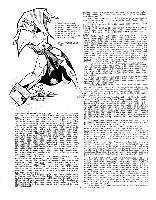
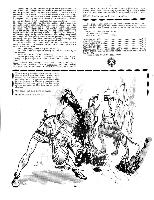

 This page is copyright © 2000/2013 by Simon van Meygaarden & Jon Ard - All Rights Reserved
This page is copyright © 2000/2013 by Simon van Meygaarden & Jon Ard - All Rights Reserved